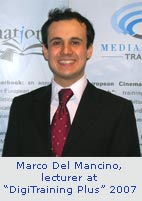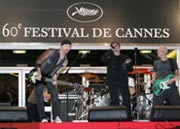
Reg.
Trib. Milano n. 418 del 02.07.2007![]()
![]()
International Edition No. 24 - year 2 - 11 July 2007

***
In this issue of our newsletter we are again presenting content from the 2007 edition of the course DigiTraining Plus, accompanied by some opinions from participants.
In particular ample space has been given to the talk by Marco Del Mancino who, using a mathematical model, has elaborated a forecast on the spread of digital screens.
This is his reply to the question “When will digital screening become a fact for most of the world’s screens?”
A prediction model applied to the spread
of digital cinema
by Marco del Mancino
 Ladies
and gentlemen, good afternoon!
Ladies
and gentlemen, good afternoon!
Firstly I’m what you might call a film buff, in second place I’m
a free-lance market researcher for MEDIA Salles. But to pay my bills I
work for an American drug company. In the next 30 minutes I’ll try
to answer a question that you may already have in mind: when will digital
cinema be a tangible reality in my town, too?
(Click
here to see the whole article)
DigiTraining Plus 2007: the voice of participants
 TONIE
DE WAELE, Royal Belgian Filmarchive, Antwerp, Belgium
TONIE
DE WAELE, Royal Belgian Filmarchive, Antwerp, Belgium
“The MEDIA Salles DigiTraining is an ideal way to get introduced
to D-Cinema; you end up with more questions that answers but it gives
you the tools to start real thinking on this evolution… and that’s
exactly what all exhibitors should do right now”.
 MONICA
TÖRNBLOM, Folkets Hus och Parker, Stockholm, Sweden
MONICA
TÖRNBLOM, Folkets Hus och Parker, Stockholm, Sweden
“This course has been very informative and interesting. I have a
new perspective on the European roll-on, on VPF-issues and on the overall
digital situation in Europe today. The networking has also been very important
for me and I wouldn’t hesitate to recommend the course to others”.
 RIITTA
HAAPIAINEN, SES Auditorium ltd, Helsinki, Finland
RIITTA
HAAPIAINEN, SES Auditorium ltd, Helsinki, Finland
“Thank you MEDIA Salles and thank you BARCO.
I have learned a lot during these four days. Of course for me, Jason Power
and Nicholas Hamon talking about projectors and servers have been my main
interest.
Also meeting colleagues has been very important.
When I came here I didn’t understand that digitalisation the cinemas
was already this far advanced.
Now I am looking forward to seeing my own digital projector and server.
And because of this course I am completely calm and not nervous anymore…
I thank you for that.
I was disappointed that there were no members from Norway, but now I have
to travel there to meet them”.

 PETER
GUSTAFSSON and MICHAEL KRISTIANSSON, Facklan
Biografer AB (Fregatten Bio AB Filmhuset Facklan), Kungsbacka, Sweden
PETER
GUSTAFSSON and MICHAEL KRISTIANSSON, Facklan
Biografer AB (Fregatten Bio AB Filmhuset Facklan), Kungsbacka, Sweden
“We were confused when we are came here. We are still confused but
at a higher level”.
 MATTHIAS
HOLTZ, Folkets Hus och Parker, Stockholm, Sweden
MATTHIAS
HOLTZ, Folkets Hus och Parker, Stockholm, Sweden
“The future of cinema is digital, and the most important thing is
that, in that future, the number of screens in Europe will not decrease
thanks to too expensive digital technology. We need to digitalize all
cinemas, not only the big city multiplex”.
 TIINA
NIIRANEN, Steroscape, Helsinki, Finland
TIINA
NIIRANEN, Steroscape, Helsinki, Finland
“Me, being a content provider – a Producer of 3D features
- these were an interesting 4 days. I learned a lot and heard lots of
interesting ways of exploiting D-cinema.
But for me digital means extra cost, though the only reasonable way of
showing 3D. What I would like to see is the ones who benefit the most
from D-cinema, the distributors, being part of these sessions, and most
important, sharing the financial charge with producers and exhibitors.
That is how we producers are able to provide more interesting content,
which will bring more happy customers to exhibitors and – in the
end make us ALL HAPPY!”
3D movies at DigiTraining
Plus 2007
Documentaries, rock concerts, animated films…the possibilities offered
by 3D cinema seem limitless, rendering plastic effects and realism that
the cinema had never achieved up until now. The participants at DigiTraining
Plus 2007 saw proof of this, when, as well as viewing documentaries on
wildlife produced by National Geographic, they were able to watch screenings
of extracts from “U2 3D” and “Fly Me to the Moon”
presented respectively by Matt Cowan, Chief Technology Officer of Real
D and Eric Dillens of Nwave.
(Per leggere il testo in italiano cliccare qui)
U2-3D
(Click here to see the fact
card of "U2-3D")
Fly Me to the Moon
(Click
here to see the fact card of "Fly Me to the Moon")
New MEDIA Salles offices
On 30 June 2007 MEDIA Salles relocated
its offices to the Milan headquarters of Agis, Italy’s entertainment
industry association.
Our new address is:
MEDIA Salles
c/o Agis Lombarda
Piazza Luigi di Savoia, 24
I-20124 Milano
Italy
Tel. +39 02 6739781
Direct line +39 02 67397823
Fax +39 02 6690410
E-mail: infocinema@mediasalles.it
We inform our readers that the e-mail address database@mediasalles.it
is no longer active.
To communicate with MEDIA Salles,
please use the following e-mail address only: infocinema@mediasalles.it
News from Italy
In Pordenone an HD projector by Sim2 for
Cinemazero
When renovation work allowed Cinemazero to add a new
screen in 2003, the slogan chosen to promote this urban, multi-screen
cinema, with a leaning towards programming art-house movies, was: “One
cinema, three screens, a thousand emotions”.
Being able to depend not only on the “Salagrande” (292 seats),
but also on two screens seating 66 spectators each, meant extending the
cinema’s offer and introducing titles destined for the more demanding
sectors of the audience.
Four years on, Cinemazero is placing its odds on the new technologies,
in order to offer its audiences new proposals and new emotions. With the
installation in “Salagrande” of an HD projector, built by
the Pordenone firm Sim2, Cinemazero is setting out, as Manager Andrea
Crozzoli puts it: “to keep up with the changes that are taking place”,
in a context that foresees the theatre developing its vocation as the
place for a communal experience “also offering concerts, sports
and other important events”…
(Per leggere
il testo in italiano cliccare qui)
Pioneers of 3-D in Italy
The four cinemas (the Arcadia of Melzo, Cinecity
Limena of the Furlan Group, the Multiplex Giometti of Porto
Sant’Elpidio and the Multiplex Le Befane of Rimini, belonging
to the Gruppo Giometti) that started screening “Meet the Robinsons”
in 3-D on 8 June have chosen the system using active glasses.
For further information on Furlan
Group see the article published in the “Women in Digital Cinema”
column, in this issue.
(Per leggere
il testo in italiano cliccare qui)
Cannes Film Festival goes digital
The sixtieth Cannes Film Festival will certainly be remembered not only for the exceptional success of Romanian cinema, with the victory of directors Cristian Mungiu [4 Months, 3 Weeks and 2 Days] in the official competition and Cristian Nemescu [California Dreamin' (Nesfarsit)] in the parallel section, “Un Certain Regard”, but also for the considerable number of digital screenings. This would seem to confirm the vocation of a festival which, ever since its foundation, has set out to promote films with a balance between artistic quality and commercial value, whilst also keeping a careful eye on the continuing evolution of technology in the audiovisual sector. This year 31 titles were digitally screened in several theatres (including the prestigious Grand Théâtre Lumière), for a total of 84 showings in the various sections (Competition, Out of Competition, Midnight Screenings, Special Screenings, 60th Anniversary, Cannes Classics, Critics’ Week, Film Market, Directors’ Fortnight). Although most of these screenings regarded films from archives, such as Suspiria by the Italian Dario Argento, and documentaries, including He Fengming by the Chinese director Bing Wang, there was no lack of brand new feature films by famous US directors, such as Zodiac by David Fincher, Ocean’s Thirteen by Steven Soderbergh and Sicko by Michael Moore. Just as there was no lack of 3-D screenings, for instance the U2 concert, by Catherine Owens and Mark Pellington, which the participants at DigiTraining Plus 2007 had had a foretaste of, at a world pre-screening. The official Festival Partner for digital screenings was the Belgian company XDC which used DoReMi JPEG2000 servers and Christie and Kinoton projectors. In connection with this, Alain Remond, General Manager of XDC France comments: “Today, digital cinema allows all members of the production and delivery chain to have the opportunity to get their stories to screen the way they intended. Indeed, since more and more movies are digitally shot and post-processed, digital screening helps avoid expensive operations to convert to 35mm, which is particularly crucial for some independent films with limited budgets”.
(Click here to see the list of titles shown digitally at the 60th Cannes Film Festival)
(Per
leggere il testo in italiano cliccare qui)

a photo of "Fly Me to the Moon"

a photo of U2 during the Cannes Film Festival
WOMEN IN DIGITAL CINEMA
Laura Trentinaglia
Head of Programming, Furlan Cinecity Group, Italy
 I
have been working for the Furlan Cinecity Group for 18 years and over
this long period of time I have experienced, together with my company,
all the transformations that have made it into what it is today –
one of the leading Italian groups in the cinema exhibition industry.
I
have been working for the Furlan Cinecity Group for 18 years and over
this long period of time I have experienced, together with my company,
all the transformations that have made it into what it is today –
one of the leading Italian groups in the cinema exhibition industry.
In this respect, our investment in digital cinema – which began towards the end of 2004 – is certainly one of the most important and “courageous” turning points, particularly when taking into account the “pioneer” spirit in which the Furlan Group started out on the long path to the new technology, which in practice represents the future of cinema.
(Click
here to read the whole article)
(Per leggere
il testo in italiano cliccare qui)